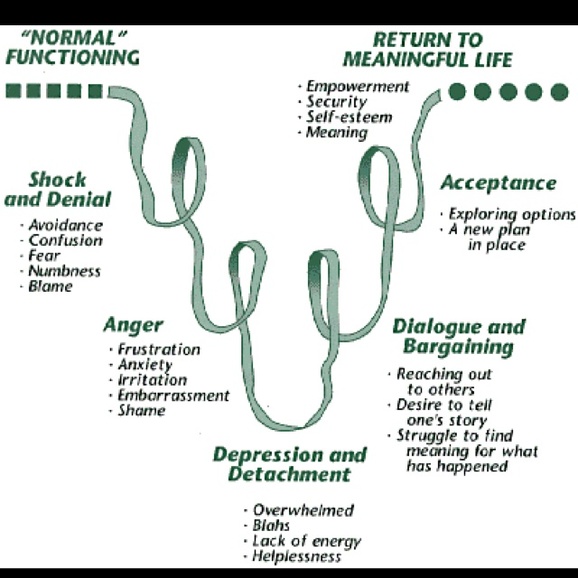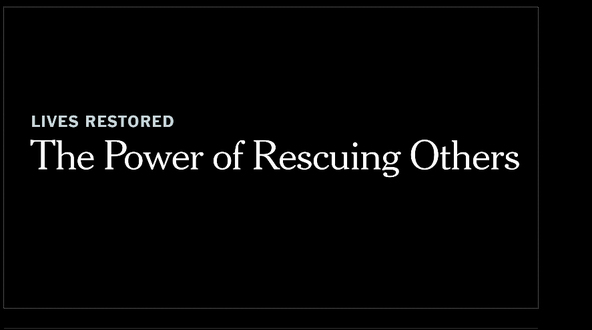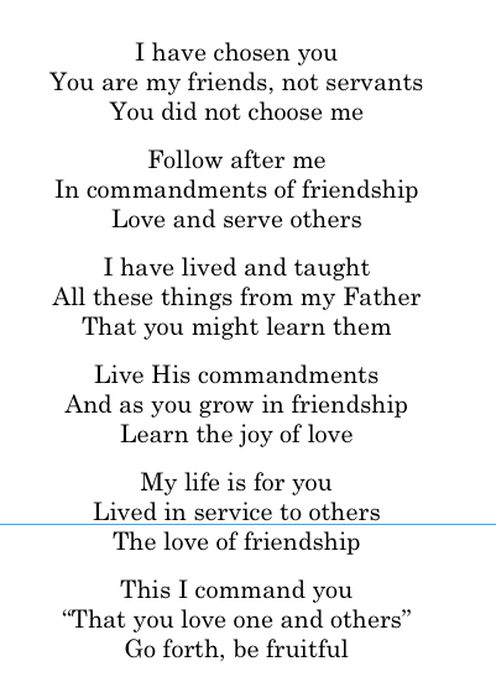Losing someone we loved
Begin with your love
Doing what you do the best
In serving others
We mourn the loss of Earl Kettler and Carol
Haiku (5-7-5) Thomastwo
(inspired by Elsabeth Kubler-Ross)
Doing what you do the best
In serving others
We mourn the loss of Earl Kettler and Carol
Haiku (5-7-5) Thomastwo
(inspired by Elsabeth Kubler-Ross)
The stages of mourning are universal and are experienced by people from all walks of life. Mourning occurs in response to an individual’s own terminal illness or to the death of a valued being, human or animal.
There are five stages of normal grief. They were first proposed by Elsabeth Kubler-Ross in her 1969 book “On Death and Dying.”
Kübler-Ross
There are five stages of normal grief. They were first proposed by Elsabeth Kubler-Ross in her 1969 book “On Death and Dying.”
Kübler-Ross
Grief is a natural process to death and dying. It is not pathological in nature, but rather, is a necessary response to helping heal from the overwhelming sense of loss when a loved one dies.
Audio ON/OFF Button
EKR Stage (The five stages of normal grief)
1 – Denial
Denial is a conscious or unconscious refusal to accept facts, information, reality, etc., relating to the situation concerned. It’s a defense mechanism and perfectly natural. Some people can become locked in this stage when dealing with a traumatic change that can be ignored. Death of course is not particularly easy to avoid or evade indefinitely.
2 – Anger
Anger can manifest in different ways. People dealing with emotional upset can be angry with themselves, and/or with others, especially those close to them. Knowing this helps keep detached and non-judgemental when experiencing the anger of someone who is very upset.
3 – Bargaining
Traditionally the bargaining stage for people facing death can involve attempting to bargain with whatever God the person believes in. People facing less serious trauma can bargain or seek to negotiate a compromise. For example “Can we still be friends?..” when facing a break-up. Bargaining rarely provides a sustainable solution, especially if it’s a matter of life or death.
4 – Depression
Also referred to as preparatory grieving. In a way it’s the dress rehearsal or the practice run for the ‘aftermath’ although this stage means different things depending on whom it involves. It’s a sort of acceptance with emotional attachment. It’s natural to feel sadness and regret, fear, uncertainty, etc. It shows that the person has at least begun to accept the reality.
5 – Acceptance
Again this stage definitely varies according to the person’s situation, although broadly it is an indication that there is some emotional detachment and objectivity. People dying can enter this stage a long time before the people they leave behind, who must necessarily pass through their own individual stages of dealing with the grief.
(Based on the Grief Cycle model first published in "On Death & Dying", Elisabeth Kübler-Ross, 1969. Interpretation by Alan Chapman 2006-2009.) http://www.ekrfoundation.org/
1 – Denial
Denial is a conscious or unconscious refusal to accept facts, information, reality, etc., relating to the situation concerned. It’s a defense mechanism and perfectly natural. Some people can become locked in this stage when dealing with a traumatic change that can be ignored. Death of course is not particularly easy to avoid or evade indefinitely.
2 – Anger
Anger can manifest in different ways. People dealing with emotional upset can be angry with themselves, and/or with others, especially those close to them. Knowing this helps keep detached and non-judgemental when experiencing the anger of someone who is very upset.
3 – Bargaining
Traditionally the bargaining stage for people facing death can involve attempting to bargain with whatever God the person believes in. People facing less serious trauma can bargain or seek to negotiate a compromise. For example “Can we still be friends?..” when facing a break-up. Bargaining rarely provides a sustainable solution, especially if it’s a matter of life or death.
4 – Depression
Also referred to as preparatory grieving. In a way it’s the dress rehearsal or the practice run for the ‘aftermath’ although this stage means different things depending on whom it involves. It’s a sort of acceptance with emotional attachment. It’s natural to feel sadness and regret, fear, uncertainty, etc. It shows that the person has at least begun to accept the reality.
5 – Acceptance
Again this stage definitely varies according to the person’s situation, although broadly it is an indication that there is some emotional detachment and objectivity. People dying can enter this stage a long time before the people they leave behind, who must necessarily pass through their own individual stages of dealing with the grief.
(Based on the Grief Cycle model first published in "On Death & Dying", Elisabeth Kübler-Ross, 1969. Interpretation by Alan Chapman 2006-2009.) http://www.ekrfoundation.org/
Abide With Me
The Spirit will lead
When you ask God for guidance
Through a loving heart
God will lead you through
The path to eternal life
Listen - your heart speaks
God never forsakes
His children’s love and requests
He is eternal
Listen to your faith
God’s plans are not only ours
But Universal
Haiku (5-7-5) Thomastwo
"I didn't fully realize it at the time, but the goal of my life was profoundly molded by this experience - to help produce, in the next generation, more Mother Teresas . . . . ."
Elsabeth Kubler-Ross
Elsabeth Kubler-Ross
Christ is Risen
" Our prime purpose in this life is to help others. And if you can't help them, at least don't hurt them." - Dalai Lama
Jesus said: “Pray, then, in this way:
‘Our Father who is in heaven, Hallowed be Your name. ‘Your kingdom come.
Your will be done, On earth as it is in heaven. ‘Give us this day our daily bread. ‘And forgive us our debts, as we also have forgiven our debtors. ‘And do not lead us into temptation, but deliver us from evil. For Yours is the kingdom and the power and the glory forever. Amen.’ "
Matthew 6:9-13
‘Our Father who is in heaven, Hallowed be Your name. ‘Your kingdom come.
Your will be done, On earth as it is in heaven. ‘Give us this day our daily bread. ‘And forgive us our debts, as we also have forgiven our debtors. ‘And do not lead us into temptation, but deliver us from evil. For Yours is the kingdom and the power and the glory forever. Amen.’ "
Matthew 6:9-13











